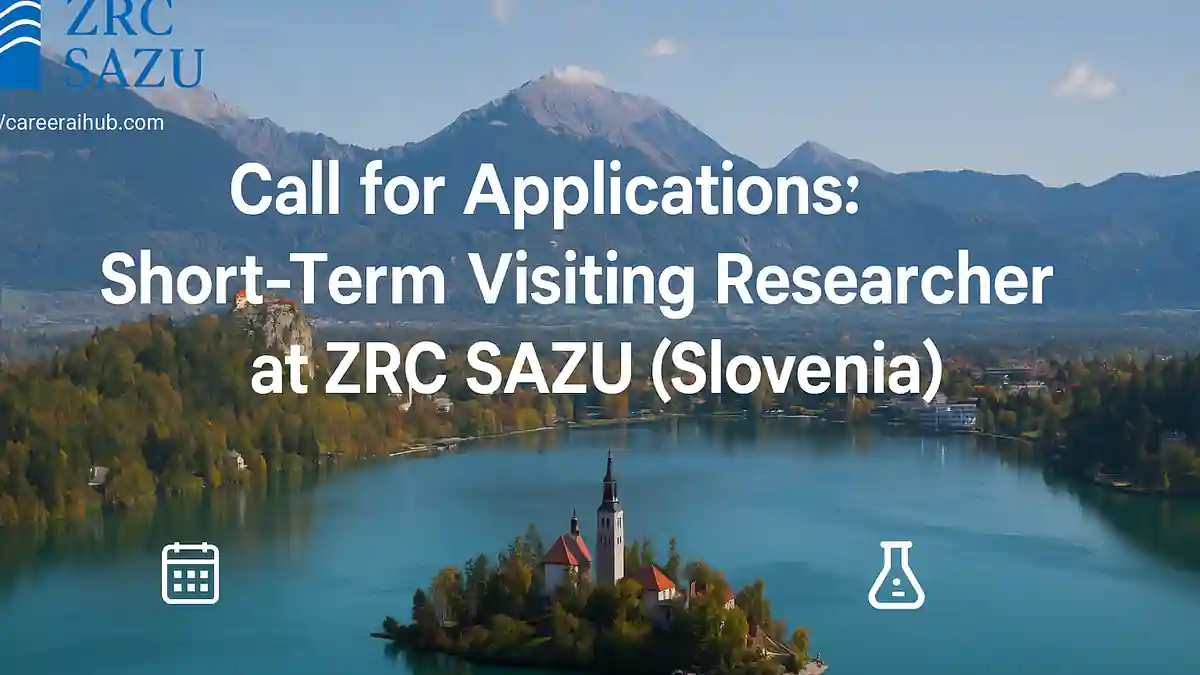Why ZRC SAZU
ZRC SAZU—the Research Centre of the Slovenian Academy of Sciences and Arts—is a leading, multi-institute hub that spans the humanities, social sciences, and select natural sciences. Its institutes are embedded in Ljubljana’s historic center, with access to extensive archives, thematic libraries, field sites, and specialized labs. Because teams work across disciplines, visitors can align their projects with distinctive Slovenian datasets (e.g., karst studies, language corpora, cultural heritage collections) while also connecting to broader European research networks.
ZRC SAZU invites short-term visiting researchers for a focused one-month stay in Ljubljana. The program welcomes PhD holders from any discipline and career stage to co-develop proposals, accelerate analysis, and establish lasting collaborations with ZRC SAZU institutes. Apply via the official call and form on the program page.
What this means for your visit
- Direct access to specialist institutes and curated research infrastructure
- Structured mentorship and proposal-building opportunities with potential supervisors
- A springboard for long-term institutional partnerships, from co-authored articles to competitive EU proposals
Programme at a Glance
- Host: ZRC SAZU, Ljubljana (Slovenia)
- Format: One-month in-person research visit
- Aim: Initiate collaborations and prepare competitive joint proposals (includingMSCA) with ZRC SAZU researchers
- Who can apply: Researchers with a PhD from any field and career stage
The call welcomes both emerging scholars planning MSCA applications with ZRC SAZU and established academics seeking to consolidate research links that produce publications and future grant pipelines.
What You Can Do During the Stay
Your plan should be realistic yet outcome-oriented. Typical activities include:
- Co-designing a fundable work plan (e.g., MSCA PF/SE, bilateral or collaborative grants)
- Conducting targeted fieldwork or archive/library research in Slovenian collections
- Testing methods, running pilot analyses, or co-authoring an article or chapter
- Mapping a multi-year collaboration between your unit and a ZRC SAZU institute
Emphasis on deliverables: The scheme favors tangible outputs—draft proposals, manuscript sections, data protocols, or method notes—rather than generic networking.
Eligibility
- PhD awarded (any discipline)
- International applicants (foreign researchers visiting ZRC SAZU)
- A committed ZRC SAZU host prepared to support your plan (identify the institute and PI before applying)
Getting started: Review ZRC SAZU’s institutes (e.g., Archaeology, Karst Research, Slovenian Language, Culture and Memory Studies) to pinpoint the best match for your project scope and methods.
Funding and Support
The program offers a one-month visiting fellowship. Specific financial terms—such as the stipend/allowance level, travel or accommodation support, and reimbursement rules—are detailed
Key Dates and Timeline
- Opening date: Stated on the call page
- Application deadline: Stated on the call page (submissions are time-stamped)
- Fellowship period: Typically one month, scheduled with your host
Because windows can be brief, assemble materials well ahead of time. Additionally, allow for host-side approvals, signature collection, and file-size constraints at submission.
How to Apply (Step-by-Step)
1) Identify your host
Shortlist one or two ZRC SAZU institutes aligned to your topic. Then, approach a potential PI with a concise one-page concept note summarizing aims, datasets, methods, and proposed outputs.
2) Agree a one-month plan
Co-draft a practical work plan: goals, methods, task schedule, expected outcomes, and a post-visit grant pathway (e.g., MSCA pre-submission calendar, internal reviews, and partner roles).
3) Download the official documents
From the program page, retrieve both the Call and Form. Next, confirm eligibility, cost categories, file formats, and any mandatory declarations.
4) Prepare your application dossier
Include:
- Short CV with selected outputs, grants, and collaborations
- Project summary (1–2 pages) focused on the one-month visit
- Work plan with milestones, deliverables, and week-by-week tasks
- Host support or commitment (as required)
- Any requested declarations, scans, or eligibility proofs
5) Submit before the deadline
Follow the prescribed submission method and file limits. Immediately archive your final PDFs and store the confirmation email or submission ID.
What Evaluators Look For
Although scoring criteria are set out in the call documents, strong applications typically show:
- Clear fit with an institute’s expertise and collections
- Feasible one-month plan with specific, time-bound outputs (e.g., proposal draft, pilot dataset, manuscript section)
- Longer-term vision for collaboration (MSCA or other joint projects)
- Added value for ZRC SAZU—novel methods, comparative data, or teaching/mentoring contributions
Choosing the Right Host Institute
ZRC SAZU’s range enables interdisciplinary projects. Illustrative tracks include:
Humanities & Heritage: Archaeology, Cultural History, Art History, Slovenian Literature, Ethnomusicology
Languages & Societies: Slovenian Language, Ethnology, Migration Studies, Philosophy
Environment & Earth Systems: Karst Research, Spatial/Geographical Studies, Palaeontology
Actionable approach: Scan institute pages for staff interests, current grants, and infrastructure. Then, craft a pitch that references specific collections, facilities, or data you will use.
Practical
Tips to Strengthen Your Application
Outcome-Driven Design: Lead with a concrete deliverable—for instance, “MSCA PF draft ready for internal review by the final week.”
Week-by-Week Plan: Specify field/archival days, lab sessions, interviews, and writing sprints. Moreover, include contingencies for access or weather-related disruptions.
Facilities and Collections: Name the archives, datasets, or instruments you will use, and explain exactly how they de-risk your methods or accelerate outputs.
Collaboration in Practice: Schedule an institute seminar or a short methods workshop; this demonstrates immediate value to the host community.
Budget Discipline: Match travel/stay assumptions to the call/form rules. Keep receipts and plan modestly to ensure compliance.
Think Beyond the Month: Commit to joint outputs (e.g., a co-authored article, a data protocol) and schedule the next grant step—internal review, external mentor feedback, and final submission.
After You Submit
Maintain contact with your prospective host. If selected, lock dates early, confirm workspace and library access, and pre-book compliant travel and lodging. Use a shared document (or project board) to track deliverables weekly and to draft the post-visit proposal while momentum remains strong.
How to Start Today
- Shortlist the most relevant institute and PI using ZRC SAZU’s directory.
- Draft a two-page visit plan with outputs, datasets, and a week-by-week schedule.
- Download the Call and Form, assemble your dossier, and submit within the posted window.
Program Snapshot
Feature | Details |
Program Name | Short-Term Visiting Researcher |
Host Country | Slovenia (Ljubljana) |
Funded By | Research Centre of the Slovenian Academy of Sciences and Arts (ZRC SAZU) |
Duration | One month |
Study Mode | Full-time, in-person visit |
Eligibility | PhD holders from any field and career stage; international applicants |
Financial Support | As defined in the Call and Form (e.g., stipend/allowance, eligible costs, reimbursement rules) |
Fields of Study | Humanities, social sciences, and select natural sciences across ZRC SAZU institutes |
Deadline | Refer to call page (month shown on site) |
Official Website |
Next cycle (indicative): Based on recent rhythms of internal calls, the following intake may appear around spring or autumn; we will update soon with the precise month once the official notice posts.
Conclusion
A one-month visit at ZRC SAZU can compress months of exploratory work into a structured, outcome-driven sprint. By choosing the right host, planning deliverables tightly, and aligning your stay with a concrete proposal path, you maximize both immediate outputs and longer-term funding prospects. Apply through the official program page and follow the Call/Form instructions precisely.
References:
- ZRC SAZU — Institutes & Overview
Frequently Asked Questions (FAQs)
It offers a one-month, in-person research visit in Ljubljana to co-develop proposals, advance analysis, and build collaborations with ZRC SAZU institutes.
Applicants must hold a PhD. Moreover, any field and career stage may apply, provided the proposal fits a ZRC SAZU institute’s expertise.
The stay typically lasts one month. However, you schedule exact dates with your host institute after selection and administrative confirmation.
Yes. Identify a ZRC SAZU institute and a willing supervisor first; then, agree on goals, methods, and expected outputs for the month.
Prepare a concise CV, project summary, week-by-week plan, host support/confirmation, and required declarations. Additionally, follow file format and size limits.
You can run archive/library work, pilot analyses, co-author manuscripts, and draft competitive proposals. Furthermore, align tasks with institute facilities and collections.
Yes, but details vary. Therefore, check the official call and form for stipend/allowance terms, eligible costs, and reimbursement rules before budgeting.
Reviewers assess fit with institute expertise, feasibility of the one-month plan, clear outputs, and longer-term collaboration potential, including future proposal pathways.
Refer to the call page for the current window. Additionally, start early to secure host confirmation and avoid last-minute file issues.
Lead with concrete deliverables, name specific facilities/collections, and provide a realistic schedule. Moreover, outline a post-visit grant plan with internal review steps.







